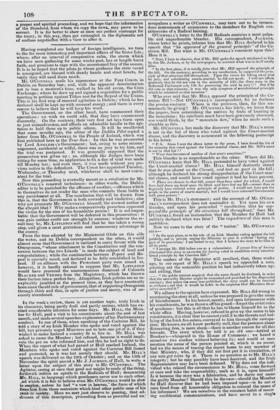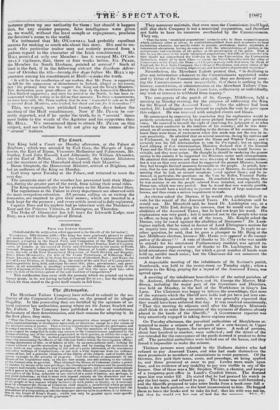In the week's review, there is yet another topic, truly
Irish in its character, being partly droll and partly serious, which has ex- cited considerable attention for some days. Mr. HILL, the Mem- ber for Hull, paid a visit to his constituents about the end of last month, and made several speeches explanatory of his Parliamentary conduct. In one of them, when speaking of the Coeicion Bill, he told a story. of an Irish Member who spoke and voted against the bill, but privately urged Ministers not to bate one jot of it, if they wished to make Ireland a country fit to live in.. Mr. HILL was asked to name the Member ; but refused, because it would impli- cate the per: on who informed him, and this he had no right to do. When the report of what had passed at Hull reached Ireland, the Members who spoke and voted against the Coercion Bill fumed and protested, as it was but seemly they should. Mr. HILL'S speech was delivered on the 29th of October ; and on the-13th of November the spirit moved a Mr. J. JACKSON, of Hull, to write a letter upon the subject of this story to Mr. O'CONNELL. The Agitator, seeing at once that good use might-be made of the thing, forthwith indites an epistle to the Radicals of Hull; denouncing Mr..HILL, in language which gentlemen never use to each other, .,:nd which it is fair to believe even Mr. O'CONNELL would be slow to employ, unless he had " a.vow in heaven,". the force of which frees him from those restraints whichbind other public men of his rank in society. Here we.rnay just observe in. passing, that ad- dresses of this description, proceeding from so powerful and un,
scrupulous a writer as O'CONNELL, may turn out to be tremen- dous instruments of annoyance to the members for English con- stituencies of a Radical leaning.
O'CoNNELL's letter to the Hull Radicals contains a most palpa- ble and unpardonable blunder. His correspondent, JACKSON, whose letter he prints, informs him that Mr. HILL declared in his speech that " he approved of the general principle" of the Co- ercion Bill. But what is Mr. O'CONNELL'S comment upon this? Here it is.
" Now, I have to observe, that if Mr. Hill spoke the speech attributed to him by this Mr, Jackson, or by the newspapers, he asserted what was in itself totally false.
" In the first place, it is totally false that Mr.' Hill opposed the principle of the bill. On the contrary, according to my recollection, he supported the prin- ciple of that atrocious bill throughout. Upon the clause for taking away trial by Jury, and • substituting courts-martial, he did.not speak. I will not affirm positively that he did not vote in the minority of 130—for there were in the Reformed Parliament only 130 for preserving the trial by jury !! ! But if he did vote in that minority, it was the only symptom of constitutional principle which he exhibited on that occasion."
Who ever said that Mr. HILL opposed the principle of the Co- ercion Bill ?—Not 0CoNNELL's correspondent, for lie declares the precise contrary. Where is the pretence, then, for this un- mannerly lie-giving? Mr. O'CONNELL has lately, we learn from the papers, been astonishing the natives by feats of hunting in the mountains : his intellects must have been grievously obscured, one would think, by the " mountain dew," when he made such a stumble as this.
Mr. O'CONNELL has made the discovery that Mr. HILL'S name is not in the list of those who voted against the Court-martial clause, and the discovery is announced in the following postscript to his letter.
" P.S. Since I sent the above letter to the press, I have found the list of the minority that voted against the Court-martial clause, and Mr. Hill's name is not in that list ! !
" What then becomes of another of that man's assertions !"
This blunder is as unpardonable as the other. Where did Mr. O'CONNELL learn that Mr. HILL pretended to have voted against the Court-martial clause? Mr. HILL himself distinctly stated that he was absent on the Circuit, and took no part in the bill; although he declared his strong disapprobation of the Court-mar- tial clause, and would have voted against it had he been present.
" There are clauses in that bill, sooner than have voted for which, I would hare laid down my head upon the block and have lost my lift—sooner than so flagrantly have violated. every principle of Justice. I would not have put the people in the power of courts-martial ; but I would have intrusted Government with great powers."
This is Mr. HILL'S statement; and the account of Mr. °Coat- NELi.'s correspondent does not contradict it. Yet upon his own blunder, and upon his pretended " recollection that be sup- ported the principle of the atrocious bill throughout," does Mr. O'CONNELL found an insinuation that the Member for Hull had publicly declared what was false ! The impudence of this man is matchless.
Now we come to the story of the " traitor." Mr. O'CoNarELL says- " In the next place, as to his tale of an Irish Member voting against the bill publicly, and in .private urging the Ministry to pass it without bating any part of its provisions,' I am bound to say that I believe the story to be false in all its parts.
" I arraign Mi. Hill before you as a calumniator. I accuse him of having fabricated this story as an excuse for having voted to annihilate every constitu- tional principle by the Coercion Bill."
The readers of the Spectator will recollect, that, three weeks ago, to our report of Mr. HILL'S speech we appended a note, pointing out the untenable position he had indiscreetly taken up; and adding, that
" the public interest required that the name should be disclosed, in order that the unworthy Member might be unmasked and punished for his disgraceful conduct ; that unless the name was published, the story could not he received as evidence ; and that it would be liable to the suspicion that Ministers them- selves invented it."
We adhere to the opinion here expressed. Mr. HILL did wrong in mentioning the story at all, unless he was prepared to give the name of his informant. In his honest, manly, and open intercourse with his constituents, he was thrown off his guard—forgot the strict rules of prudence: but this is all that he has to blame himself for in the whole affair. Having, however, refused to give up the name to his constituents, it is clear that he cannot yield it to the threats and bul- lying of the Irish fire-eaters, conveyed to him through the newspa- pers. Heknows,we all know perfectly well, that the pretence about distrusting him, is mere sham—there is another reason for all this bravado.. °The story which he told is an old one—tattled at Brookes's—whispered in the House of Commons we heard it . ourselves (we confess without believing it); and would at once mention the name" of the person pointed at, which is no secret, had we the means of tracing the report home to any member of that Ministry, who, if they did not first put it in circulation, at- any rate got totes by it. There is no question as to Mr. HILL's integrity; but he may possibly have been deceived, and the Irish Representative may have been defamed. Why does not the indi- vidual who related the circumstance to Mr. HILL, come forward at once and take the responsibility, such -as it is, upon himself? Is it because the 'story was a fabrication, and he dares not name the guilty Member? Should this be the case—should the Member for. Hull discover that he had been imposed upon—is he not at once freed from all honourable obligation to conceal the name of his informant? We are ourselves in the constant habit of receiv ing confidential communications, and have never in a single instance givain 'up our 'authority for theta:. but Should it happen that; for any sinister purpose, false intelligence were given us, we would, without the least scruple or repugnance, proclaim the deceiver's name to the world.
We intimated that Mr. O'CONNELL had -probably excellent reasons for making so much ado about this story. His zeal to un- mask this particular traitor may not entirely proceed from a jealous regard to the character of the- Irish constituency.. Mr. }I'LL pointed at only one Member : has it escaped Mr. CrCoN- NELL'S vigilance, that, three or four weeks betbre, Mr. PEASE, the Member for South Durham, pointed at several Y Such at least is the fact, if in the following extract the Durham Adver- tiser of October the 4th—twenty-jive days before Mr. HILL'S ap- pearance among his constituents at Hull—s?eaks the truth.
,4 It will be in the recollection of our readers, that Mr. Pease, in supporting the bill for the suppression of -disturbances in Ireland, alleged as his reason, that ' his primary duty was to support the King and the -King's Ministers.' This declaration gave great offence at the time to the honourable Member's Ultraltadical supporters ; and since his arrival in the North, he has been re. moustrated with for voting as he did on that measure. To these rtmonstrances, we have been told, Mr. Pease replied, thathe was ' requested to rote as he did by several Irish Members, who wished, but durst not vote jisr it themselves r " This, we repeat, was publiShed twenty-five days before the meeting of the Hull constituency. Now if..Mr. PEASE be cor- rectly reported, and if he spoke the truth, he is "several" times more liable to the wrath of the Agitator and his supporters than Mr. HILL. We recommend them to attack Mr. PEASE on this subject, and see whether he will not give up the names of the " several" traitors.



















 Previous page
Previous page